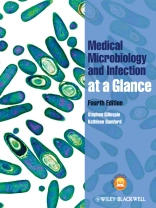This concise and popular introduction to medical microbiology and
infection encapsulates the fundamental facts and principles of this
rapidly growing and changing subject area. Written by experienced
clinicians and teachers, it covers the basic concepts of medical
microbiology, and the main human pathogens and infectious
syndromes, in an accessible and lucid format.
This fully updated fourth edition is now supported by a
companion website at href=’http://www.ataglanceseries.com/medicalmicrobiology’>www.ataglanceseries.com/medicalmicrobiology
containing extra self-assessment cases, colour slides, further
reading, and key point summaries.
Medical Microbiology and Infection at a Glance is an
invaluable revision aid for medical and allied health students and
junior doctors, and is ideal for anyone seeking a comprehensive and
concise guide to this subject area.
Table des matières
Preface to fourth edition,
Preface to first edition,
Concepts
Chapter 1 Structure and classification of bacteria,
Chapter 2 Innate immunity and normal flora,
Chapter 3 Pathogenicity and pathogenesis of infectious
disease,
Chapter 4 The laboratory investigation of infection,
Chapter 5 Antibacterial therapy,
Chapter 6 Antibiotics in clinical use,
Chapter 7 Resistance to antibacterial agents,
Chapter 8 Sources and transmission of infection
Chapter 9 Principles of infection control,
Chapter 10 Infection in the hospital environment,
Chapter 11 Immunisation,
Chapter 12 Emerging infections,
Bacteriology
Chapter 13 Staphylococcus,
Chapter 14 Streptococcal infections,
Chapter 15 Streptococcus pneumoniae, other Gram-positive
cocci and the a-haemolytic streptococci,
Chapter 16 Listeria, Bacillus Corynebacterium, and environmental
mycobacteria
Chapter 17 Diphtheria, Tetanus, and Pertussis
Chapter 18 Pathogenic mycobacteria,
Chapter 19 Clostridium,
Chapter 20 Non-sporing anaerobic infections,
Chapter 21 Neisseria, and Moraxella,
Chapter 22 Small Gram-negative coccobacilli: Haemophilus,
Brucella, Francisella, Yersinia and
Bartonella,
Chapter 23 Pathogenicity of enteric Gram-negative bacteria,
Chapter 24 Enterobacteriaceae clinical syndromes,
Chapter 25 Vibrio, Campylobacter and
Helicobacter,
Chapter 26 Environmental pathogens: Pseudomonas,
Burkholderia and Legionella,
Chapter 27 Chlamydia, Mycoplasma and
Rickettsia,
Chapter 28 Spiral bacteria,
Virology
Chapter 29 Virus structure, classification and antiviral
therapy,
Chapter 30 Herpesviruses I,
Chapter 31 Herpesviruses II,
Chapter 32 DNA viruses: adenovirus, parvovirus and poxvirus,
Chapter 33 Measles, mumps and rubella,
Chapter 34 Influenza viruses,
Chapter 35 Parainfluenza and other respiratory viruses
Chapter 36 Enterovirus and viruses infecting the
gastrointestinal tract,
Chapter 37 Hepatitis viruses,
Chapter 38 Tropical, exotic or arbovirus infections,
Mycology
Chapter 39 Yeast infections,
Chapter 40 Filamentous fungi,
Parasitology
Chapter 41 Intestinal protozoa,
Chapter 42 Malaria, leishmaniasis and trypanosomiasis,
Chapter 43 Gut helminths,
Chapter 44 Tissue helminths,
Systemic infection
Chapter 45 Congenital and perinatal infections,
Chapter 46 HIV infection and AIDS,
Chapter 47 Pyrexia of unknown origin and septicaemia,
Chapter 48 Endocarditis, myocarditis and pericarditis,
Chapter 49 Infections of the central nervous system,
Chapter 50 Respiratory tract infections,
Chapter 51 Urinary and genital infections,
Chapter 52 Infections of the bones and joints,
Chapter 53 Bacterial diarrhoeal disease,
Chapter 54 Zoonoses,
Chapter 55 Infections in immunocompromised patients,
Chapter 56 Ocular infections,
Chapter 57 Infections of the skin and soft tissue,
Index
A propos de l’auteur
Stephen H. Gillespie is the Sir James Black Professor of
Medicine at The Medical School, University of St Andrews
Kathleen B. Bamford is Consultant Medical Microbiologist and
Visiting Professor at Imperial College Healthcare NHS Trust and
Imperial Colleage London, and Hammersmith Hospital, London












